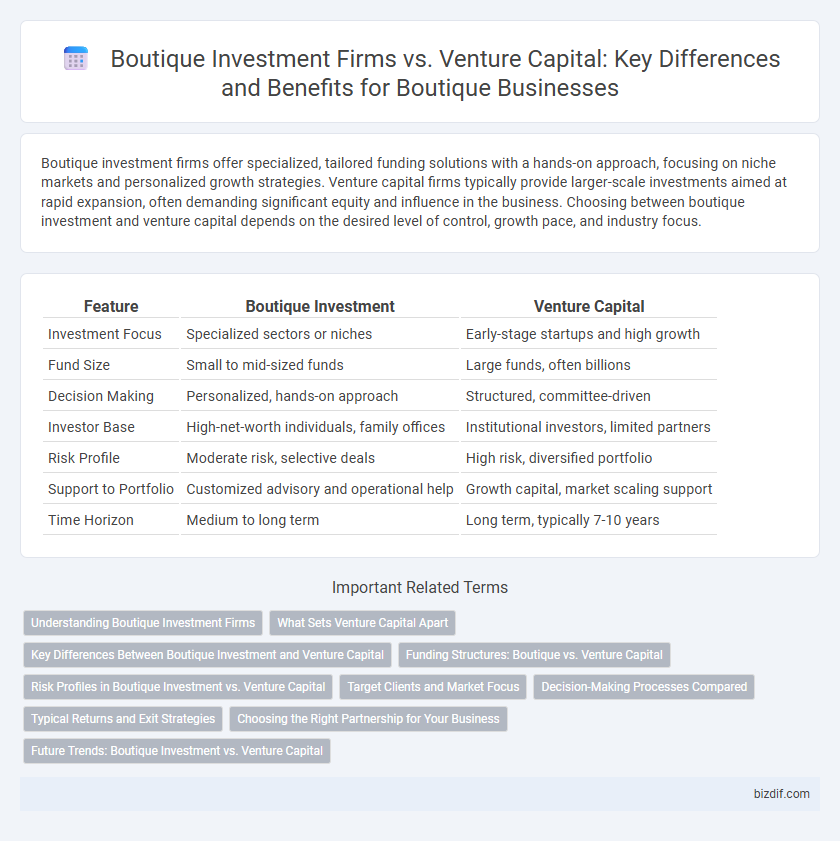Boutique investment firms offer specialized, tailored funding solutions with a hands-on approach, focusing on niche markets and personalized growth strategies. Venture capital firms typically provide larger-scale investments aimed at rapid expansion, often demanding significant equity and influence in the business. Choosing between boutique investment and venture capital depends on the desired level of control, growth pace, and industry focus.
Table of Comparison
| Feature | Boutique Investment | Venture Capital |
|---|---|---|
| Investment Focus | Specialized sectors or niches | Early-stage startups and high growth |
| Fund Size | Small to mid-sized funds | Large funds, often billions |
| Decision Making | Personalized, hands-on approach | Structured, committee-driven |
| Investor Base | High-net-worth individuals, family offices | Institutional investors, limited partners |
| Risk Profile | Moderate risk, selective deals | High risk, diversified portfolio |
| Support to Portfolio | Customized advisory and operational help | Growth capital, market scaling support |
| Time Horizon | Medium to long term | Long term, typically 7-10 years |
Understanding Boutique Investment Firms
Boutique investment firms specialize in tailored financial services, often focusing on niche markets or specific industries where they offer personalized expertise and hands-on management. Unlike venture capital firms that primarily invest in high-growth startups for equity stakes, boutique firms provide a broader range of advisory and capital solutions, including mergers and acquisitions, restructuring, and strategic consulting. Their concentrated approach allows for deeper client relationships and customized investment strategies that align with the unique goals of individual businesses.
What Sets Venture Capital Apart
Venture capital distinguishes itself in the investment landscape through its focus on high-growth startups with scalable business models, accepting higher risks for potentially significant returns. Unlike boutique investment firms that may offer personalized, niche market strategies, venture capital provides substantial funding rounds and strategic support to accelerate innovation and market entry. This emphasis on rapid expansion, technology-driven ventures, and exit strategies through IPOs or acquisitions defines venture capital's unique position in funding early-stage companies.
Key Differences Between Boutique Investment and Venture Capital
Boutique investment firms specialize in personalized financial services and tailored advisory for a niche clientele, often focusing on mergers and acquisitions, while venture capital firms invest in early-stage startups with high growth potential by providing capital in exchange for equity. Boutique investments tend to emphasize long-term strategic partnerships and customized deal structures, whereas venture capital prioritizes rapid scalability and market expansion. Risk tolerance in boutique investments is typically moderate and deal-specific, contrasting with venture capital's inherently high-risk, high-reward investment model centered on innovation-driven enterprises.
Funding Structures: Boutique vs. Venture Capital
Boutique investment firms typically offer customized funding structures tailored to specific industry niches or business needs, often emphasizing flexible equity stakes or revenue-sharing models. Venture capital firms generally provide structured funding through staged equity investments, aligning with growth milestones and predefined exit strategies. The bespoke approach of boutiques contrasts with venture capital's standardized funding rounds and dilution practices.
Risk Profiles in Boutique Investment vs. Venture Capital
Boutique investment firms typically exhibit lower risk profiles compared to venture capital due to their focus on specialized, smaller-scale deals and personalized client strategies. Venture capital involves higher risk by funding early-stage startups with uncertain outcomes but offers potential for significant returns. Assessing risk tolerance and investment horizon is crucial when choosing between boutique investment and venture capital opportunities.
Target Clients and Market Focus
Boutique investment firms typically target high-net-worth individuals and specialized market sectors, offering tailored financial services with a focus on personalized client relationships. In contrast, venture capital firms primarily invest in early-stage startups across high-growth industries such as technology and healthcare, aiming for scalable market opportunities. Boutique firms emphasize niche expertise and customized strategies, while venture capital prioritizes rapid growth potential and portfolio diversification.
Decision-Making Processes Compared
Boutique investment firms emphasize personalized decision-making with in-depth analysis of niche markets and tailored client needs, often involving senior partners directly in each investment. Venture capital firms prioritize rapid scaling potential and portfolio diversification, relying on structured evaluation frameworks and data-driven criteria to assess startups. The boutique model fosters closer stakeholder relationships, while venture capital focuses on broader market trends and high-growth opportunities.
Typical Returns and Exit Strategies
Boutique investment firms often target niche markets with specialized expertise, delivering typical returns ranging from 15% to 25%, focusing on gradual growth and strategic partnerships for exits. Venture capital funds generally pursue higher-risk startups with potential returns exceeding 30%, relying heavily on initial public offerings (IPOs) or mergers and acquisitions (M&A) as primary exit strategies. Exit timing in boutique investments tends to be more flexible, prioritizing long-term value creation, whereas venture capital exits are often driven by aggressive growth and market scalability.
Choosing the Right Partnership for Your Business
Boutique investment firms offer personalized, sector-specific expertise and hands-on support tailored to niche markets, contrasting with venture capital firms that provide larger-scale funding with broader industry focus and standardized processes. Selecting the right partnership depends on your business stage, growth objectives, and need for specialized guidance versus access to extensive networks and capital. Careful evaluation of each firm's track record, investment approach, and value-added services ensures alignment with your strategic goals and long-term success.
Future Trends: Boutique Investment vs. Venture Capital
Boutique investment firms are increasingly specializing in niche markets with tailored strategies that prioritize long-term value creation over rapid scaling, contrasting with venture capital's focus on high-growth startups and aggressive exit timelines. Emerging trends indicate a growing preference for boutique investments in sectors like sustainable technologies and personalized healthcare, where deep domain expertise and customized funding can drive superior outcomes. Data from recent market analysis shows boutique funds outperforming traditional venture capital in terms of investor returns within these specialized industries, highlighting a shift towards more focused and strategic investment approaches.
Boutique Investment vs Venture Capital Infographic

 bizdif.com
bizdif.com